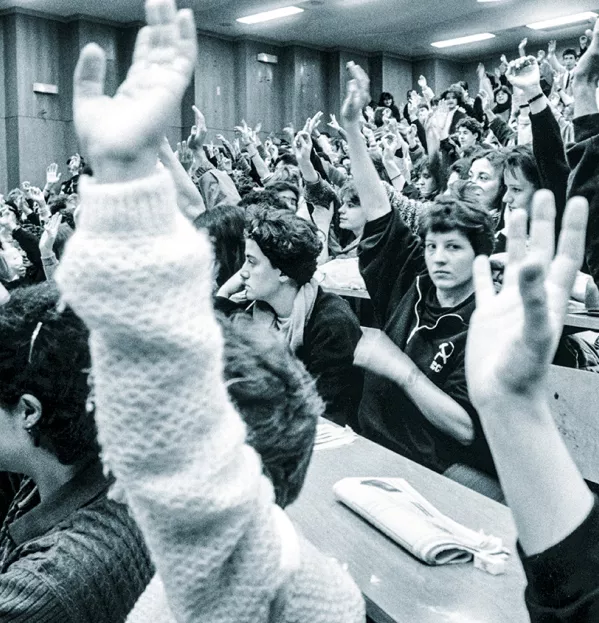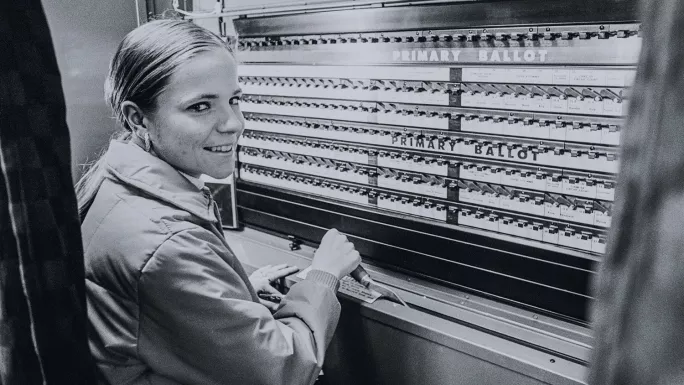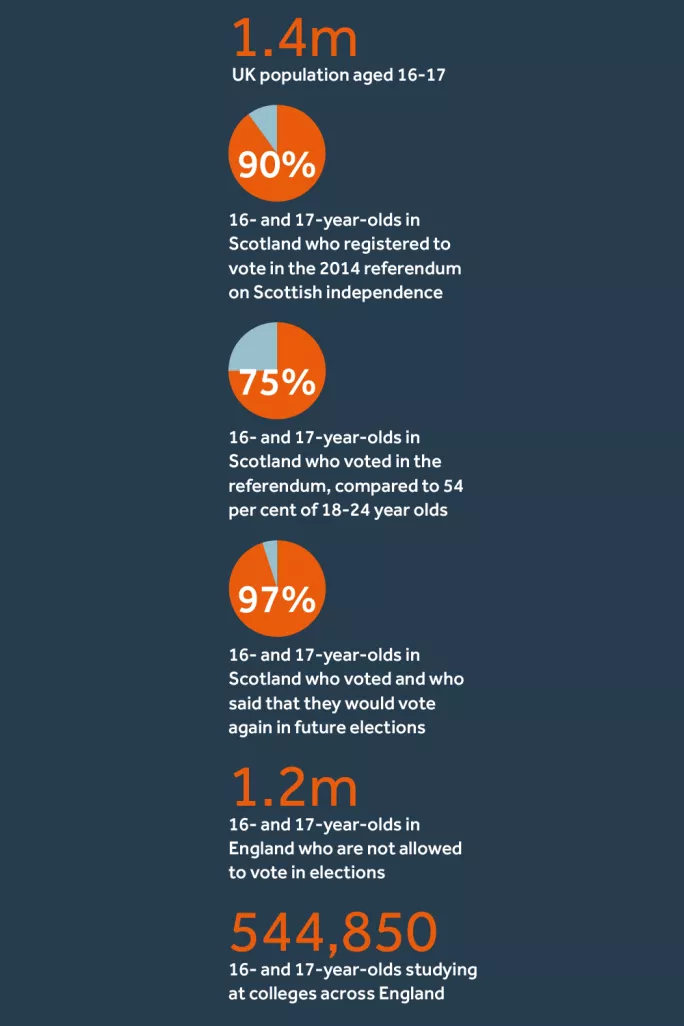FE joins the fight to lower the voting age to 16

There are a lot of things people are allowed to do when they turn 16. Get married, work, pay taxes - and even serve in the armed forces. But they are denied the right to vote.
However, the debate over lowering the voting age in England from 18 to 16 is gaining momentum, with clear divisions between the rest of the UK prompting demands for change. In Scotland, 16- and 17-year-olds are allowed to vote in Scottish elections. And last month, the Welsh government announced plans to allow young people aged 16-17 to vote in council elections.
The Association of Colleges is now stepping into the fight for votes at 16. Today, it is launching its Fair.Vote campaign with the NUS students’ union, in a bid to mobilise colleges and their students - amounting to more than half a million 16- and 17-year-olds - in calling for the voting age to be lowered.
The time is right for the AoC to take a stand on this issue, according to its chief executive David Hughes. The decision was prompted by the cross-party support for a private member’s bill introduced in Parliament by Labour MP Peter Kyle last year.

The bill proposes lowering the voting age to 16, automatically adding 16- to 24-year-olds to the voting register and that educational establishments act as polling stations during elections. It is co-signed by Conservative MP and former education secretary Nicky Morgan, along with former Liberal Democrat minister Norman Lamb, among others. Other high-profile supporters of the voting age being reduced include former education secretary Justine Greening and the former chancellor, George Osborne.
‘Discussion and persuasion’
The AoC wants colleges and their students to lobby MPs to support the bill, which will be debated in Parliament in May. Later this month, an “education for democracy day” will be held where colleges will invite local MPs to take part in debates on the voting age.
However, getting support from the AoC’s membership has not been easy, admits Hughes. Campaigning for extra funding for colleges is one thing, but asking for colleges to get behind an initiative to fight for the rights of their students is a different matter, he says.
“When we started talking about the campaign to members there were lots of raised eyebrows and questions about whether we should be doing something like this and whether it was too political”.
Although for some AoC members it has “taken a bit of discussion and persuasion”, they have quickly understood the wider issues involved, according to Hughes. “Education is empowering,” he says. “It helps people become citizens and understand how our participative democracy operates, and therefore helping young people to really engage in politics is really, really important.”

Hughes adds: “How do you make young people feel like they’ve got a stake in our society, like their voice matters? What you do is, you say: ‘We think you should have a vote.’”
Some 544,850 people aged 16-17 attend colleges across England. The campaign to give them the vote is the first time the AoC has tried to mobilise students on a national scale. It would make 16- and 17-year-olds more of a concern for politicians, which “in turn would be a good way of colleges being seen as a part of the way we help young people enter the world,” according to Hughes.
The AoC’s involvement is a welcome development, according to Kyle. He says: “The significance about the FE sector weighing in so comprehensively into this debate is that it gives structure and organisation to the voice and passion that is out there among young people themselves.”
Many FE students feel “rightly aggrieved that they are expected to pay tax, are able to obtain welfare benefits and yet are denied the most basic right in a democracy,” comments Robbie Young, NUS vice president for society and citizenship.
‘Basic right’
His perspective is shared by Amy Smith, president of Sheffield College Students’ Union, who says: “The 16- and 17-year-olds at my college are expected to take responsibility for their own lives and futures…despite all this, they are still denied the basic right to elect those who will make decisions on their behalf.”
Karen Spencer, principal and chief executive at Harlow College, is one of many college leaders backing the new campaign. She says: “Young people have a lot of responsibilities at the age of 16. As an educator, I feel it’s an important part of our democracy that they also have rights, like the right to vote at 16.”
But the government has yet to consider such a move. Last month, David Lidington, minister for the cabinet office, told MPs that the government is committed to keeping the voting age at 18 and has “no plans to lower the voting age in elections”.
Colleges could “make all the difference” in mobilising 16- and 17 year-olds and “empowering them to challenge a closed and undemocratic political system,” according to Norman Lamb.
He adds: “The further education sector gives young people the skills, wisdom and maturity that the country relies on.
“If it can also speak with a united voice to demand that these people should be given a say over their own futures, that is something no government can ignore.”
You need a Tes subscription to read this article
Subscribe now to read this article and get other subscriber-only content:
- Unlimited access to all Tes magazine content
- Exclusive subscriber-only stories
- Award-winning email newsletters
Already a subscriber? Log in
You need a subscription to read this article
Subscribe now to read this article and get other subscriber-only content, including:
- Unlimited access to all Tes magazine content
- Exclusive subscriber-only stories
- Award-winning email newsletters